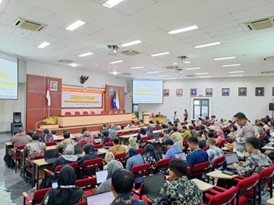
Yogyakarta, September 5th 2024 – The Graduate School of Gadjah Mada University (SPs UGM) held Seminar and Webinar Series #3 titled “Innovation and Technology Transfer and the Availability of Human Resources in Railways.” This seminar is the final series of the “Socialization and Evaluation of Achievements in the Railway Transportation Sub Sector 2015 – 2024.” The event took place in the SPs UGM Auditorium and online via Zoom. It was attended by various stakeholders, academics, students, and competent speakers in the field of railways.
The seminar began with a speech by the Vice Rector for Planning, Assets, and Information Systems, Mr. Arief Setiawan Budi Nugroho, S.T., M.Eng., Ph.D. In his speech, Mr. Arief emphasized the need for independence in technology use and the availability of human resources in railways to face future challenges. “In the future, we need to achieve national independence, not just relying on foreign technology. The Indonesian railway will face challenges; human resources are key to how we can develop capable personnel,” he explained.
The seminar continued with a presentation from Mr. Santoso Sinaga, S.T., M.Sc., Acting Director of Railway Facilities at DJKA. He delivered a presentation titled “Policy on Railway Technology Development.” He explained the principles of sustainable transportation, the master plan for Indonesian railways, the development of railway facilities and infrastructure, and hopes and challenges for Indonesian railways. He also outlined several targets for Indonesian railways by 2030, such as increasing the share of passenger rail from 4% (currently) to 7-9% and the share of freight rail from 1.1% (currently) to 11-13%.
The seminar then featured a presentation from representatives of the Railway Department of PT Adhi Karya (Persero) Tbk., titled “Innovation and Technology Transfer in Railway Infrastructure Construction at LRT Jabodebek.” This was presented by Mr. Siswanto, General Manager, and Mr. Hardjita, Manager of Operations. Mr. Siswanto discussed the construction of the LRT Jabodebek, explaining the use of U-Shaped girders, which are considered more streamlined and environmentally friendly. Meanwhile, Mr. Hardjita elaborated on the technology implemented in the construction, including the Seismic Detection and Alert System (SDAS) used to detect and provide information regarding earthquakes. “(SDAS) detects earthquakes; if the tremor is significant, the train will be ordered to stop immediately, but if it is minor, the train will stop at the next station,” he said.
Next, Mr. Febry Pandu Wijaya, General Manager of Research and Development at PT INKA, presented various achievements in products and development collaborations. One of the development projects he discussed was a new electric multiple unit (KRL) project, aimed at minimizing the issue of importing used trains. “With the new KRL project, the issue of importing used trains can be minimized,” he stated.
The seminar continued with a presentation from Mr. Ahmad Husnan Arofat, Manager of Research & Development at PT Len Industri. He explained innovations in railway signaling technology in Indonesia and introduced several PT Len products in this field, such as SilVue, SiLSafe, SiLTrack, and SiLMove. He also discussed future hopes for the development of railway signaling, noting, “Developments in railways are not inexpensive due to safety guarantees, and we hope to find economies of scale.”
The seminar also featured Mr. Hermanto Dwiatmoko, Chairman of the Indonesian Railway Society (MASKA). In his presentation titled “Technology Transfer and the Availability of Human Resources in Indonesian Railways,” he stressed the importance of synergy between technology readiness and human resources. “The success of technology transfer requires synergy between technology readiness and human resources,” he said.
The session concluded with comments from Ir. Fauzun, S.T., M.T., Ph.D., IPM., ASEAN Eng., as a discussant. He highlighted the crucial role of the government and the involvement of higher education institutions in the development of railways in Indonesia. “Higher education institutions have many experts in the railway field, so they need to be more involved, not just foreign consultants,” he explained.
The seminar then moved into a discussion session moderated by Mr. Krishna Amier Hamzah, Secretary I of MASKA. During this session, the moderator opened the floor for questions from offline attending participants. Attendees actively inquired about topics ranging from innovations and mastery of railway technology to the readiness of human resources in the railway sector.
The seminar concluded with a summary by the moderator. Mr. Krishna emphasized the need for integration among institutions or stakeholders in the railway sector therefore various railway programs and policies do not operate in isolation. “This discussion should continue for deeper insights, as today’s topics are numerous and time is limited,” he added.
Author: Syarif Hidayatulloh
